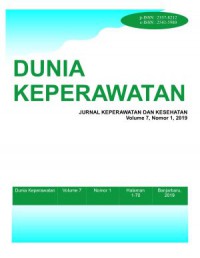
Jurnal
SUARA SHOLAWAT SIMTUBDHURAR TERHADAP RESPIRASI, DENYUT JANTUNG DAN SATURASI OKSIGEN PADA NEONATUS BBLR
LBW neonates have a proportion of 20% of all infant birth rates in the world and often experience stress that is manifested by increased heart rate and respiration and decreased oxygen saturation. Stimulation therapy is needed that can support growth and development. Sound therapy can provide peace for the neonate, so far there is no known sound effect of sholawat for LBW neonates. This study aims to look at the sound effect of sholawat on heart rate, respiration and oxygen saturation in LBW neonates. The research method using Pre Experimental One Group Pre-Post Test Design was carried out on 15 infants treated at the NICU and used purposive sampling technique from October to December 2018. The instruments used by MP3s containing the sound were Simtubdhurar prayer 40 minutes of playing through speakers with maximum sound get to the subject of 60 decibels measured by a sound level meter. The mean
heart rate and respiration after receiving treatment showed a decrease and increase in oxygen saturation. There was a significant decrease in pulse (Sig. (2-tailed)= 0.001) and respiration (Asymp. Sig. (2-tailed)= 0.009) and increased oxygen saturation (Asymp. Sig. (2-tailed)= 0.004) on the third day of treatment. The sound of prayer has an influence on pulse, respiration and oxygen saturation in LBW neonates. Sholawat sounds can be a choice of complementary
therapies while undergoing treatment in the NICU room.
Availability
No copy data
Detail Information
- Series Title
-
Dunia Keperawatan Jurnal Keperawatan dan Kesehatan, Vol. 7 No. 1, Maret 2019
- Call Number
-
(05) 610.5 PRO d
- Publisher
- Banjarbaru : Prodi Ilmu Keperawatan, Fak. Kedokteran, Univ. Lambung Mangkurat., 2019
- Collation
-
Hlm. 62-69
- Language
-
Indonesia
- ISBN/ISSN
-
2337-8212
- Classification
-
(05) 610.5 PRO d
- Content Type
-
-
- Media Type
-
-
- Carrier Type
-
-
- Edition
-
Vol. 7 No. 1
- Subject(s)
- Specific Detail Info
-
-
- Statement of Responsibility
-
-
Other version/related
No other version available
File Attachment
Comments
You must be logged in to post a comment
 Computer Science, Information & General Works
Computer Science, Information & General Works  Philosophy & Psychology
Philosophy & Psychology  Religion
Religion  Social Sciences
Social Sciences  Language
Language  Pure Science
Pure Science  Applied Sciences
Applied Sciences  Art & Recreation
Art & Recreation  Literature
Literature  History & Geography
History & Geography